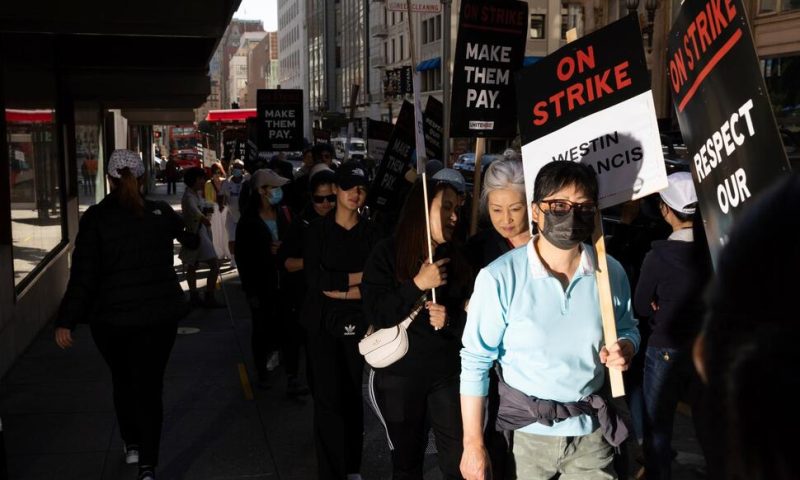More than 10,000 workers at 25 U.S. hotels are on strike after choosing Labor Day weekend to amplify their demands for higher pay, fairer workloads and the reversal of COVID-era cuts
More than 10,000 workers at 25 U.S. hotels were on strike Monday after choosing Labor Day weekend to amplify their demands for higher pay, fairer workloads and the reversal of COVID-era cuts.
The UNITE HERE union, which represents the striking housekeepers and other hospitality workers, said 200 workers at the Hilton Baltimore Inner Harbor were the latest to walk off the job.
Nearly half of the striking workers – or 5,000 – are in Honolulu. That includes Briana Canencia, a food server for over a decade at a Marriott property who said she was on the picket line fighting for not only higher wages, but also respect amid reduced hours and increased workloads.
Canencia, who is Native Hawaiian, said she works a second job in order to provide for her two kids, and yet they live paycheck-to-paycheck. She said she worries that her family will soon be “priced out of paradise.”
“It’s very important to me to be able to raise my children here and get them familiar with their ancestral home, because our blood is here, our family is here,” she said. “We deserve to be here.”
Thousands of workers are also on strike in Boston, San Francisco, Seattle, San Diego and San Jose, California. The strikes targeting Marriott, Hilton and Hyatt hotels were set to last one to three days.
UNITE HERE said a total of 15,000 workers have voted to authorize strikes, which could soon spread to other cities, including New Haven, Connecticut; Oakland, California; and Providence, Rhode Island.
Union President Gwen Mills says the strikes are part of long-standing battle to secure family-sustaining compensation for service workers on par with more traditionally male-dominated industries.
“Hospitality work overall is undervalued, and it’s not a coincidence that it’s disproportionately women and people of color doing the work,” Mills said.
Unionized housekeepers want to reinstate automatic daily room cleaning at major hotel chains, saying they have been saddled with unmanageable workloads, or in many cases, fewer hours and a decline in income. Many hotels cut services during the coronavirus pandemic and never restored them.
But hotels say guests are no longer asking for daily room cleaning and some other services.
Hyatt and Hilton both said Monday that they have contingency plans in place to minimize the impact of the strikes at their hotels. Marriott didn’t respond to a request for comment.
Michael D’Angelo, the head of labor relations for Hyatt in the Americas, said in a statement Monday that the chain offers competitive wages and benefits, including in the markets where workers are striking.
“We are disappointed that UNITE HERE has chosen to strike while Hyatt remains willing to negotiate,” D’Angelo said. “We look forward to continuing to negotiate fair contracts and recognize the contributions of Hyatt employees.”
Hilton said through a spokesperson that it remains “committed to negotiating in good faith to reach fair and reasonable agreements that are beneficial to both our valued team members and to our hotels.”
UNITE HERE hopes to replicate its recent success in Southern California, where after repeated strikes it won significant wage hikes, increased employer contributions to pensions and fair workload guarantees in a new contract with 34 hotels. Under the contract, housekeepers at most hotels will earn $35 an hour by July 2027.

